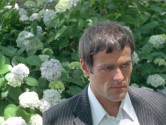
Black Sin
Itinerary of Jean Bricard
Black Sin (Schwarze Sünde)
Directed by Danièle Huillet and Jean-Marie Straub. With Andreas von Rauch, Vladimir Theye, Howard Vernon
West Germany 1988, 35mm, color, 42 min. German with English subtitles
Straub-Huillet filmed the third version of The Death of Empedocles, the unfinished late-18th-century play by the German lyric poet Friedrich Hölderlin, in the dazzling sunlight and mottled shadow of the Sicilian landscape. It was there that the Greek pre-Socratic philosopher Empedocles legendarily cast himself into the volcanic fires of Mount Etna to prove his immortality. Empedocles debates Pausanias, his loyal disciple (erômenos), about the divine powers of love and strife that govern all matter, whether the strange and mystical elements of air, fire, water, and earth, or the mercurial and tragic behavior of gods and humans, mad in their compulsion to forsake nature and each other. Black Sin is a meticulous rereading and reworking of a play whose first version Straub-Huillet had adapted in The Death of Empedocles.
Itinerary of Jean Bricard (Itinéraire de Jean Bricard)
Directed by Danièle Huillet and Jean-Marie Straub
France 2007, 35mm, b/w, 40 min. French with English subtitles
Scarred by wartime occupation and postwar pollution, Coton Island is a palimpsest of history brought vividly to life in Jean Bricard’s childhood memories. The island, strategically located on the Loire, was once a lively port town with ash trees, vineyards, and tributaries alive with salmon and shad. But in 1944 Coton Island was occupied by the Germans and became the setting for brutal roundups and executions (including that of Bricard’s uncle) and for small acts of heroic resistance. Collaborating with Huillet on the script, Straub completed Itinerary after her death in 2006. He filmed Coton Island against a stark and leaden winter light; he used deliberatively long tracking shots and nearly still compositions to evoke a kind of enduring resilience.
Straub-Huillet filmed the third version of The Death of Empedocles, the unfinished late-18th-century play by the German lyric poet Friedrich Hölderlin, in the dazzling sunlight and mottled shadow of the Sicilian landscape. It was there that the Greek pre-Socratic philosopher Empedocles legendarily cast himself into the volcanic fires of Mount Etna to prove his immortality. Empedocles debates Pausanias, his loyal disciple (erômenos), about the divine powers of love and strife that govern all matter, whether the strange and mystical elements of air, fire, water, and earth, or the mercurial and tragic behavior of gods and humans, mad in their compulsion to forsake nature and each other. Black Sin is a meticulous rereading and reworking of a play whose first version Straub-Huillet had adapted in The Death of Empedocles.
Scarred by wartime occupation and postwar pollution, Coton Island is a palimpsest of history brought vividly to life in Jean Bricard’s childhood memories. The island, strategically located on the Loire, was once a lively port town with ash trees, vineyards, and tributaries alive with salmon and shad. But in 1944 Coton Island was occupied by the Germans and became the setting for brutal roundups and executions (including that of Bricard’s uncle) and for small acts of heroic resistance. Collaborating with Huillet on the script, Straub completed Itinerary after her death in 2006. He filmed Coton Island against a stark and leaden winter light; he used deliberatively long tracking shots and nearly still compositions to evoke a kind of enduring resilience.





























